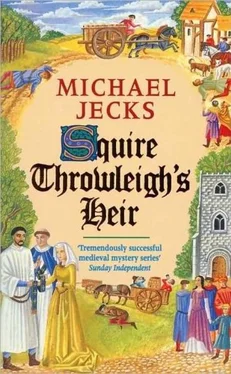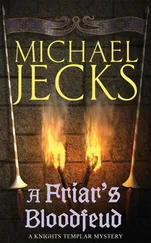‘Why should you wish to know such a thing?’ Stephen asked, and his voice had an angry edge to it once more. ‘Are you trying to spread rumours about my brethren who may have fallen from the high ideals they should have embraced?’
‘No, no, Brother. I am simply trying to clear the point in my mind.’
‘Well, clear your mind of the point. It doesn’t concern you.’
Baldwin could see that he had unwittingly overstepped the mark once more, and again he offered profuse apologies. Eventually the priest relented, and the small spots of anger on his cheeks faded.
Sitting quietly, Baldwin wasn’t fully convinced by Stephen’s argument. Absolute conviction could only come from explaining his difficulty in detail, ideally to a senior cleric, and that was impossible. The more important the man, the more likely he was to be ambitious, and the more likely he would be to inform the church hierarchy of a renegade Templar. That thought brought to mind other functionaries, and Baldwin found himself meditating once more on the steward of the house. ‘I must ask, Brother, are you aware of any reason why Daniel should hate the farmer in Throwleigh, the one called Edmund?’
‘Him? The tenant to be evicted?’ Stephen asked, but Baldwin was sure he saw a flicker in the priest’s eyes. ‘What could a steward have against a man like him?’
‘Nothing that I can understand,’ Baldwin said honestly. ‘Yet he appears to want to harry Edmund into an early grave. Was Daniel particularly fond of the young squire?’
The priest pursed his thin lips, as if debating whether to answer. When he spoke, it was with a certain caution, as if he was measuring his words with care. ‘I doubt whether Daniel was any more fond of the child than I myself, and I was not. No doubt it is unkind to state the fact so badly on the day of the child’s burial, but I could not find it in me to like Master Herbert. He was wilful, disobedient, and often deceitful. I was regularly forced to chastise him. On the very day his father died, he… Well, perhaps I shouldn’t say more.’
‘Please tell me,’ Baldwin said. ‘I fail to understand what could have happened.’
‘Very well. That same morning, young Master Herbert was found by his father trespassing in the orchard with two friends. When seen, Herbert helped his accomplices to escape, and then, when he was asked by his father who the two were, he lied, saying he’d seen no one. He subsequently proceeded to plead for them, when it was plain to all that they must be punished. The last command Squire Roger gave to me was that I should whip the child, and so I did. Children, Sir Baldwin, have to be trained, the same as any other animal. They must be taught to respect their elders, to tell the truth, and to behave honourably. I fear Master Herbert was not able to do these things. Perhaps in Sir Reginald of Hatherleigh’s service the lad might have learned.’
‘Perhaps,’ Baldwin agreed, but he was secretly shocked at the priest’s candid words. It was appalling, listening to the man who was to bury the child, talking about him like this.
‘I think that was probably why the squire himself died.’
Baldwin looked up. ‘Eh?’
‘I only meant that since the squire fell dead from some imbalance in his bodily humours, they must have been caused by something. He left here in a tearing hurry to go hunting, but was delayed because he had to ride off to demand that the friends of his son should be punished. Thus logically I feel fairly sure that Master Herbert, although unwittingly, was himself a parricide.’
‘You don’t truly mean to say you believe that the child was guilty of his father’s death?’ Baldwin cried.
‘Oh, it’s all very well, Sir Baldwin, to wish to think the best of all the dead,’ said Stephen huffily. ‘But hypocrisy is not one of my faults. In any case, I am only telling you what others also think. Even the boy’s mother blamed him.’
‘Lady Katharine?’ Baldwin burst out.
The priest nodded calmly. ‘Yes, Sir Baldwin. I know you saw how she treated her son at her husband’s grave. It was perfectly obvious, was it not? After that, I don’t know if she felt anything more than loathing for her son. She had loved her husband, you see. And when her son caused him to die, I think she lost all feeling for him. Poor child.’ He stared thoughtfully through the window. ‘He was always unlucky.’
‘In what way?’
Stephen threw him a surprised look, as if he had been musing to himself and had forgotten that Baldwin was present. ‘Hmm? Oh, I only mean that he often got himself into scrapes – and then again he was ever a hapless child. For example, he was present when another local boy died, a little chap called Tom – only a toddler. He fell into a well, and young Master Herbert didn’t fetch help. Usual sort of thing, often happens. But I don’t think the parent ever truly forgave him.’
Baldwin kept the eagerness from his voice as he asked, ‘Whose child was it who died?’
Stephen shrugged. ‘A maid from the village who works here for Lady Katharine – I think because my Lady took pity on her.’
‘Oh? Is she the wife of Edmund?’ asked Baldwin, recalling Christiana’s face and wondering whether she worked at the hall.
‘Him? Good God, no!’ For the first time Stephen gave a dry smile. ‘No, Anney’s husband was still more feckless than Edmund. Anney’s man left her shortly after the birth of her second son, Tom. It was found that he was already married.’
Baldwin felt curiously deflated. He had hoped it might be Edmund. It could have explained much.
‘There was no reason to think Anney would have tried to harm the boy, Sir Baldwin,’ Stephen said sharply. ‘She blamed him, certainly, but that’s different from harbouring a lethal grudge. Her boy fell into the well – you know how dim these villein children can be. The only aspect of culpability was Master Herbert’s inability to call for help, but he was only three years and a half at the time, and not many boys so young would have been able to do anything. The Church shows us that children are like lunatics – they don’t act with free will because they can’t distinguish between right and wrong. That’s why children under fourteen aren’t legally responsible for their actions. Anney wouldn’t have hurt him, I am sure. No doubt she regretted he didn’t call for help – but regret is a different emotion from that which demands the wreaking of vengeance. She’s a good woman; she wouldn’t bear ill-feeling towards Master Herbert.’
‘What of her husband?’
‘Ah, well, he’s no longer here for us to ask him. I fear he shan’t be seen in these parts again.’ Stephen gave a thin smile. ‘I arrived in Throwleigh a little before the drowning of her child and he was gone by then; I heard he went shortly after the birth of the second boy. Tom, the boy who died, wouldn’t have known him. I understand Anney gave and received nuptial vows, but his promises weren’t valid: he was already wedded. The bastard left her to raise both boys fatherless.’
‘Where did he go?’
‘Back to his first wife – somewhere down towards Exeter, I heard. Her brothers came and collected him.’
‘This Anney must be lonely.’
Stephen looked at him with genuine surprise. ‘Why should you think that? She has enough to keep her busy. She even has her own cottage in Throwleigh, although it looks ready to collapse.’
Baldwin thanked him, and soon after left the priest to prepare for the interment of the child. The knight walked thoughtfully down the stairs and out into the yard towards the stables, but every now and again his attention was drawn to the door of the storeroom, where Herbert’s body waited for its burial – and on his face was fixed a puzzled frown.
Читать дальше












